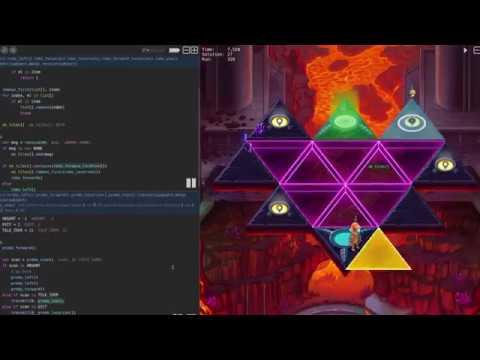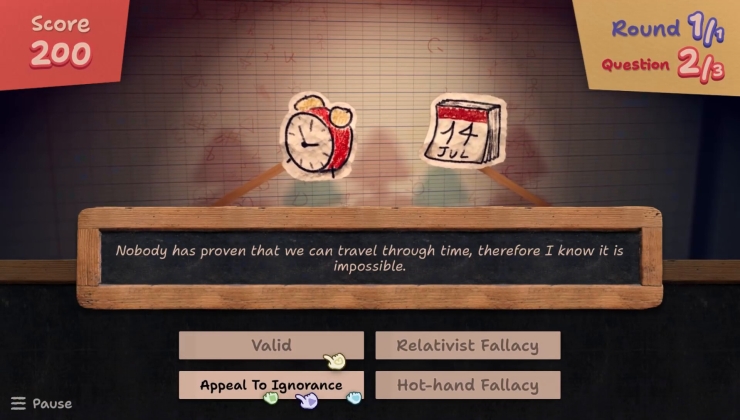Now that the programming-puzzle game Robo Instructus has been out for just a year, the developer has written up a blog post talking about sales and how it went.
What is it? Robo Instructus is a puzzle game in which players manoeuvre a robot by issuing instructions via a simple programming language. As players progress through the game they unlock new functions to overcome new puzzles, each of which can be solved in multiple ways. The more you master the robot, the more elegant and powerful your solutions will be. This is not a game of moving logic blocks around, it needs actual programming.
So now you know what it is, how did it do after a whole year? Not well in terms of sales or even player progression. Going by achievements, only 5% managed to complete 2 of the 4 acts. As for sales: in total it sold 2,571 copies which is just over 200 a month. Split across stores that was 2,544 sold on Steam and a mere 27 came from itch.io. Across different operating systems on Steam, keeping in mind this was developed on Linux and launched with Windows/Linux support and macOS came ~2 months later:
- Windows - 89.7%
- Linux - 7.6%
- Mac - 2.7%
Their takeaway is that you obviously need Windows support on Steam and it's not something a game developer can keep going with. This led to Alex Butler, who wrote the post, mentioned that they went back into a regular software engineering job in October 2019. Like I've said many times in the past—if you're a small developer publishing on Steam, it's very difficult to get much now unless you have some good marketing and it sounds like the wider press largely ignored Robo Instructus.
You can see the full post here and pick up the game on itch.io or Steam.

Direct Link
If you wish to see sales numbers from other developers check out our dedicated tag.
Tough times.
Last edited by Linas on 17 Jul 2020 at 3:49 pm UTC
I'd guess that spending an hour or two each day to spread the word, go into communities, etc. is a necessity.
So hard for indies these days. Unless you're lucky to land on the next big thing, it just doesn't look like the money is there.
Even a Linux gamer, who only buys Linux games, would have hard time noticing these smaller games.That's why GoL exists.
First off: Congratulations to Alex! You shipped your game and sold a few thousand copies! And also, you were nice and quick with replies to player feedback and the game really evolved over a short period of time, so that deserves an award as well :)
About the achievement statistics on player progression: this is not an easy game! The first few levels are easy to understand and the code to write to solve the puzzle is somewhat obvious. But that quickly changes! Players are required to come up with complex conditional structures, recognize opportunities for loops and manage a growing volume of features on both the bot as well as the environment.
Also: keep in mind that some players will spend time early on to optimize their code to get a good ranking on the very zach-like performance graphs.
So maybe a decent share of the 95% of users who did not finish the second half of the game sunk some hours into developing different strategies for the levels they completed up to that point or were simply overwhelmed. If you are new to programming, the amount of code and thinking you are tasked with seem like a steep increase of "game" turning into "work" and "research". Don't get me wrong, that can be totally fun and satisfactory, but maybe not what most of the players consider to be fun.
Programming games are a small niche with a small player base. They will never be as popular as a yearly shooter or small distraction like flappy bird or a runner game.
So how do then the gamers out there with no coding experience (or interest!) see this game?
If I purchased this game it would be simply to test the concept. Not with any intention to invest a lot of time in it. So selling 200 copies a month of a game of this concept, with no marketing power behind it... My honest reaction was that it didn't sound that bad at all.
Last edited by Beamboom on 17 Jul 2020 at 9:47 pm UTC
I think he is reading too much into the achievements. For puzzle games in particular, I find it normal to not finish games or stop at some point; either because you got stuck, lost interest, or because just that first part was enough. Or because you took a break from the game for other reasons and just picked it back again. It still can be quite satisfactory even if you stop early. And, on top of that, for most games there are the people that just fire up the game and stop without achieving even the most trivial, automatic achievements (kill your first enemy, play for 15 minutes, finish the prologue).
To be honest though - the concept of this game is really, really niche. Like, exceptionally so. Almost so I'd place it in a genre of itself. I have a background in coding and am not "scared" by the concept of writing code, but even I must admit that it's not code writing I'm most in the mood for when I fire up my Steam client.
So how do then the gamers out there with no coding competence (or interest!) see this game?
If I purchased this game it would be simply to test the concept. Not with any intention to invest a lot of time in it. So selling 200 copies a month of a game of this concept, with no marketing power behind it... My honest reaction was that it didn't sound that bad at all.
I have a quite strong coding background, but my work isn't quite in software development (I write code for my research but it's more math and reading than coding). Programming puzzles for me are a way to scratch my programming itch without the boring and frustrating parts of a "real" programming project. But if I was doing actual work in the area, I wouldn't get close to such a game. :P
I think this is more of an exception than the rule, though. There is probably some mix of programmers who aren't burned out and non-programmers that are comfortable enough with some "light" scripting. Programming puzzles are a niche, but somehow a big enough niche to be a genre in itself.
Even a Linux gamer, who only buys Linux games, would have hard time noticing these smaller games. There is simply so much to choose from. Even on an indie haven such as itch.io it's very hard to get noticed. Probably even harder.Even more so, if you count in that Proton™ is AWESOME and one does not need to play Linux games when she/he can spend his/her money on AAA Windows games instead. ;)
Tough times.
P.S. I didn't even hear about this game prior to this article.
I think selling 2500+ copies of this ultra-niche game is actually quite a good score.
I get it. It was a passion project. But those rarely sell unless you're passionate about mainstream topics.
Last edited by devland on 17 Jul 2020 at 8:19 pm UTC
Hang on, why do you have the URL for the game on Steam included but not for Itch? Itch is a much better store as it allows you to tip the developer.A simple oversight that has been corrected. FYI: we have a dedicated correction report feature you can use instead of comments to ensure we pick up stuff like that 👍
Even being a coder, I don't usually appreciate coding games.Neither do I. I love programming. I love video games. But I seriously dislike programming games. They make me feel like I am getting the satisfaction of neither. I don't feel like I am playing, but neither am I actually achieving anything, because it is all "fake".
Interestingly enough, I once had a chat with an actual trucker who tried getting into Euro Truck Simulator 2, and it made him feel in a similar way. I guess just because you love your work, it doesn't mean that you want more "work" when you play a game.
But being a programmer, i never could finish a programming game. I always lose interest. I tried Human Resource Machine, While True: Learn, Screeps, Shenzen I/O, TIS-100 and others but not one of then i played for more than 2 hours. I really dont know why.
Games about logic i tend to like more than programming games
Interestingly enough, I once had a chat with an actual trucker who tried getting into Euro Truck Simulator 2, and it made him feel in a similar way. I guess just because you love your work, it doesn't mean that you want more "work" when you play a game.
I read a report about these simulation games (some are incredibly successful, AFAIR, farming simulator has sold more copies than GTA V in the year the latter came out) and they are often played by people working in the simulated job. It might be a different thing for farmers than programmes, they can drive fancy vehicles they'll never get a hand on in real life. I considered that strange... until I found myself (as a software developer) playing through TIS-100, Human Resource Machine, Seven Billion Humans, ...
There is probably some mix of programmers who aren't burned out and non-programmers that are comfortable enough with some "light" scripting.
Oh, absolutely! They may be script hackers of the most enthusiastic order in their life outside of gaming. But core question here is: Do they WANT to spend their gaming time writing code?
Interestingly enough, I once had a chat with an actual trucker who tried getting into Euro Truck Simulator 2, and it made him feel in a similar way. I guess just because you love your work, it doesn't mean that you want more "work" when you play a game.
I read a report about these simulation games (some are incredibly successful, AFAIR, farming simulator has sold more copies than GTA V in the year the latter came out) and they are often played by people working in the simulated job. It might be a different thing for farmers than programmes, they can drive fancy vehicles they'll never get a hand on in real life. I considered that strange... until I found myself (as a software developer) playing through TIS-100, Human Resource Machine, Seven Billion Humans, ...
I also work as a developer, and I also enjoy programming games. I think the reason is similar to what you describe with the farmers, that these games represent something you normally don't experience at your day job. At work, a large proportion of my time is spent talking to product owners and business people to understand what needs to be done, with planning and testing functionality, and writing documentation. Whereas with these games, you can just get down to the fun part of it, without any of the tedious stuff you normally do at work.












 How to set, change and reset your SteamOS / Steam Deck desktop sudo password
How to set, change and reset your SteamOS / Steam Deck desktop sudo password How to set up Decky Loader on Steam Deck / SteamOS for easy plugins
How to set up Decky Loader on Steam Deck / SteamOS for easy plugins
See more from me